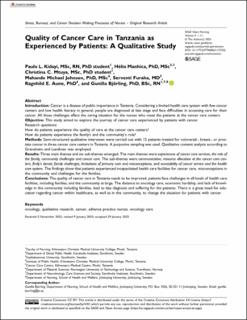Quality of Cancer Care in Tanzania as Experienced by Patients: A Qualitative Study
Kidayi, Paulo L.; Manhica, Hélio; Mtuya, Christina C.; Mahande, Michael Johnson; Furaha, Serventi; Aune, Ragnhild Elizabeth; Björling, Gunilla
Peer reviewed, Journal article
Published version
Permanent lenke
https://hdl.handle.net/11250/3098977Utgivelsesdato
2023Metadata
Vis full innførselSamlinger
- Institutt for materialteknologi [2562]
- Publikasjoner fra CRIStin - NTNU [38679]
Sammendrag
Introduction
Cancer is a disease of public importance in Tanzania. Considering a limited health care system with few cancer centers and low health literacy in general, people are diagnosed at late stage and face difficulties in accessing care for their cancer. All these challenges affect the caring situation for the nurses who meet the patients at the cancer care centers.
Objective
This study aimed to explore the journey of cancer care experienced by patients with cancer.
Research questions:
How do patients experience the quality of care at the cancer care centers?
How do patients experience the family’s and the community's role?
Methods
Semi-structured qualitative interviews were carried out with 15 patients treated for colorectal-, breast-, or prostate cancer in three cancer care centers in Tanzania. A purposive sampling was used. Qualitative content analysis according to Graneheim and Lundman was employed.
Results
Three main themes and six sub-themes emerged. The main themes were experiences of cancer care services, the role of the family, community challenges and cancer care. The sub-themes were communication, resource allocation at the cancer care centers, fmily's denial, family challenges, limitations of primary care and misconceptions, and accessibility of cancer service and the health care system. The findings show that patients experienced incapacitated health care facilities for cancer care, misconceptions in the community and challenges for the families.
Conclusions
The quality of cancer care in Tanzania needs to be improved, patients face challenges in all levels of health care facilities, including families, and the community at large. The distance to oncology care, economic hardship, and lack of knowledge in the community including families, lead to late diagnosis and suffering for the patients. There is a great need for education regarding cancer within healthcare, as well as in the community, to change the situation for patients with cancer.

